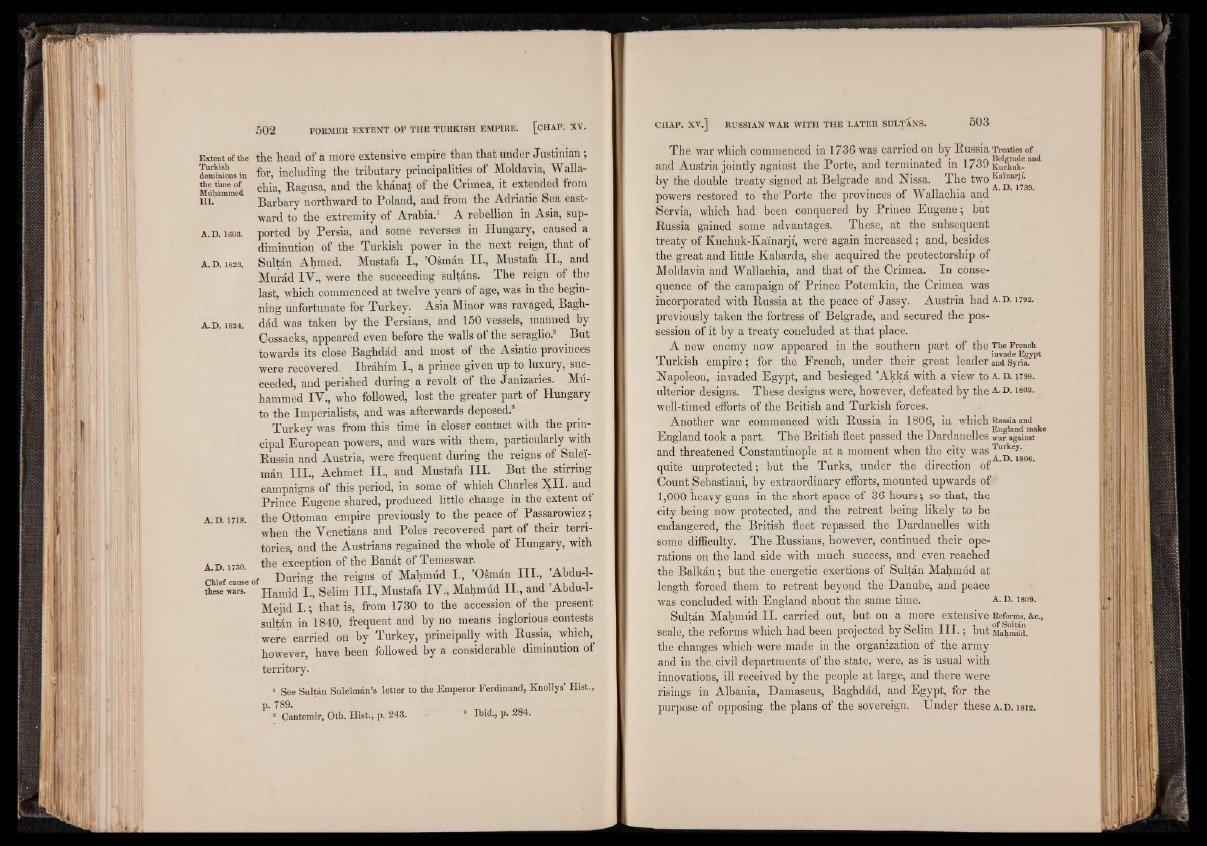
Extent of the the head of a more extensive empire than that under Justinian;
“ onsin for, including the tributary principalities of Moldavia, Walla-
Múhammed chia, Ragusa, and the khánat of the Crimea, it extended from
hi. amme Barbary northward to Poland, and from the Adriatic Sea eastward
to the extremity of Arabia.1 A rebellion in Asia, sup-
a .d . 1603. ported by Persia, and some reverses in Hungary, caused a
diminution of the Turkish power in the next reign, that of
A. d . isas. Sultán Ahmed. Mustafa I., ’Osmán II., Mustafa II., and
Murád IY., were the succeeding sultáns. The reign of the
last, which commenced at twelve years of age, was in the beginning
unfortunate for Turkey; Asia Minor was ravaged, Bagh-
a .d . 1624. dád was taken by the Persians, and 150 vessels, manned by
Cossacks, appeared even before the walls of the seraglio.2 But
towards its close Baghdad and most of the Asiatic provinces
were recovered. Ibráhím I., a prince given up to luxury, succeeded,
and perished during a revolt of the Janizaries. Mu-
hammed IY., who followed, lost the greater part of Hungary
to the Imperialists, and was afterwards deposed.3
Turkey was from this time in closer contact with the principal
European powers, and wars with them, particularly with
Russia and Austria, were frequent during the reigns of Sulei-
mán III., Achmet II., and Mustafa III. But the stirring
campaigns of this period, in some of which Charles XII. and
Prince Eugene shared, produced little change in the extent of
a. D. 1718. the Ottoman empire previously to the peace of Passarowiez ;
when the Yenetians and Poles recovered part of their territories,
and the Austrians regained the whole of Hungary, with
A D 1730 the exception of the Banát of Teineswar.
1 During the reigns of Mahmúd I., ’Osmán III., ’Abdu-1- Chief canse of ° • ¡¡H i -.1 , , , TT i
these wars. Hamid I., Selim III., Mustafa IY., Mahmud II., and Abdu-1-
Mejid I. \ that is, from 1730 to the accession of the present
Sultán in 1840, frequent and by no means inglorious contests
were carried on by Turkey, principally with Russia, which,
however, have been followed by a considerable diminution of
territory. -
1 See Sultán Suleiman’s letter to the Emperor Ferdinand, Knollys’ Hist.,
p. 789.
2 Cantemir, Oth. Hist., p. 243. 3 Ibid., p. 284.
The war which commenced in 1736 was carried on by Russia Treaties of
and Austria jointly against the Porte, and terminated in 1739 KuSr-**1
by the double treaty signed at Belgrade and Nissa. The ^w0^aj^a^ 39
powers restored to the Porte the provinces of Wallachia and ‘ •
Servia, which had been conquered by Prince Eugene; but
Russia gained some advantages. These, at the subsequent
treaty of Kuchuk-Kainarji, were again increased; and, besides
the great and little Kabarda, she acquired the protectorship of
Moldavia and Wallachia, and that of the Crimea. In consequence
of the campaign of Prince Potemkin, the Crimea was
incorporated with Russia at the peace of Jassy. Austria had a .d . 1792.
previously taken the fortress of Belgrade, and secured the possession
of it by a treaty concluded at that place.
A new enemy now appeared in the southern part of the The French
Turkish empire; for the French, under their great leader and Syria.
Napoleon, invaded Egypt, and besieged ’Akká with a view to a. d . 1798.
ulterior designs. These designs were, however, defeated by the A-D-I802-
well-timed efforts of the British and Turkish forces.
Another war commenced with Russia in 1806, in which Russia
England took a part. The British fleet passed the Dardanelles war against
and threatened Constantinople at a moment when the city was]’"2 ey-
H m , i . 1 v ,• „A .D . 1806. quite unprotected; but the I urks, under the direction ot
Count Sebastiani, by extraordinary efforts, mounted upwards of
1,000 heavy guns in the short space of 36 hours; so that, the
city being now protected, and the retreat being likely to be
endangered, the British fleet repassed the Dardanelles with
some difficulty. The Russians, however, continued their operations
on the land side with much success, and even reached
the Balkán; but the energetic exertions of Sultán Mahmúd at
length forced them to retreat beyond the Danube, and peace
was concluded with England about the same time. A- 1809-
Sultán Mahmud II. carried out, but on a more extensive Reforms, &c,
scale, the reforms which had been projected by Selim I I I .; but Mahm&i.
the changes which were made in the organization of the army
and in the civil departments of the state, were, as is usual with
innovations, ill received by the people at large, and there were
risings in Albania, Damascus, Baghdád, and Egypt, for the
purpose of opposing the plans of the sovereign. Under these a .d . 1812.